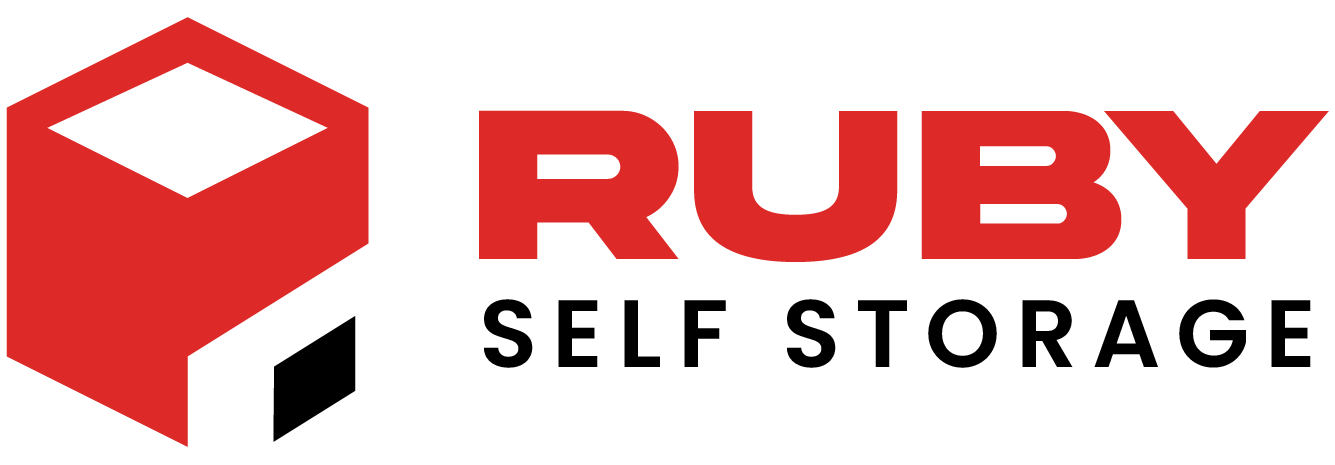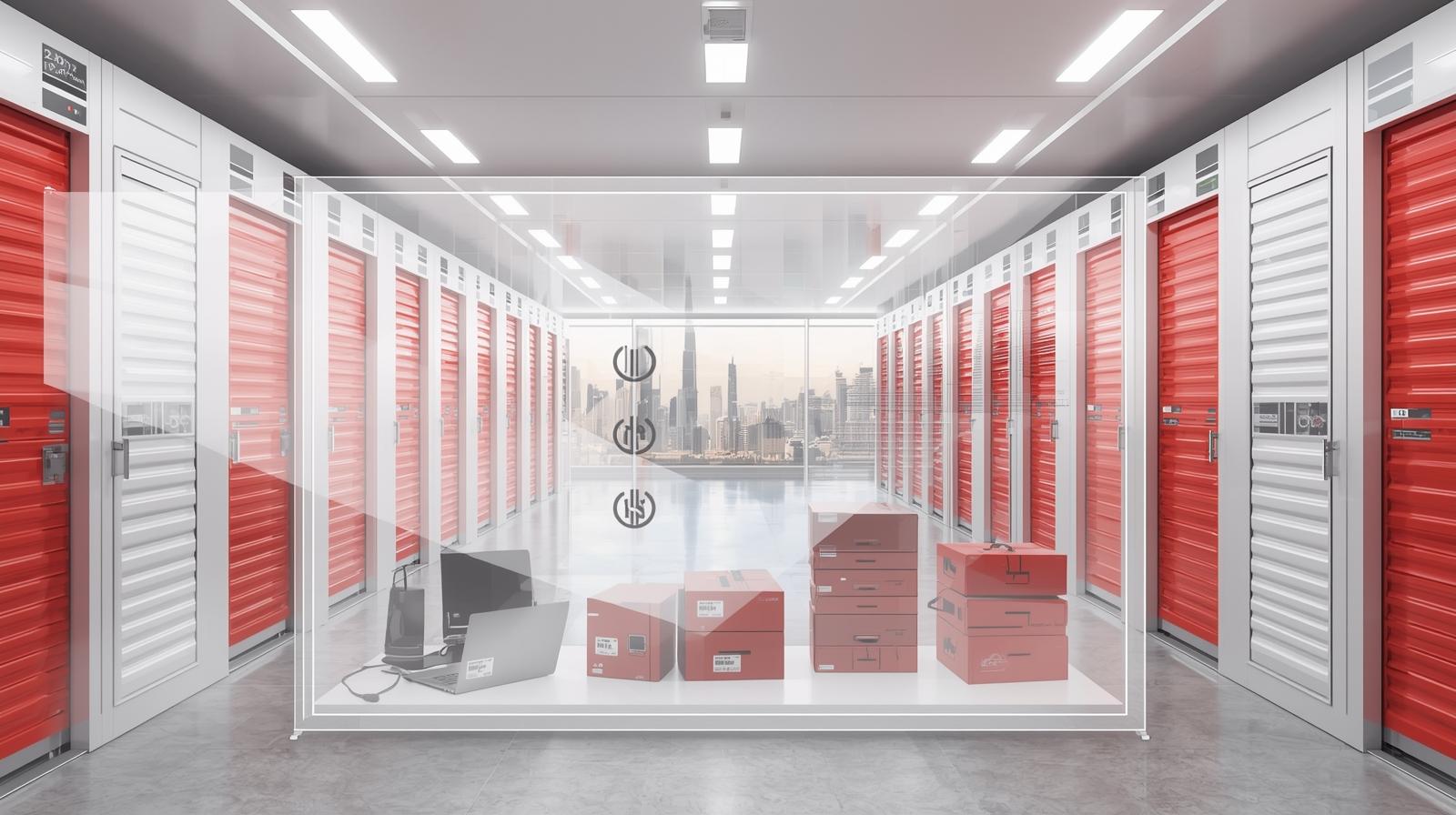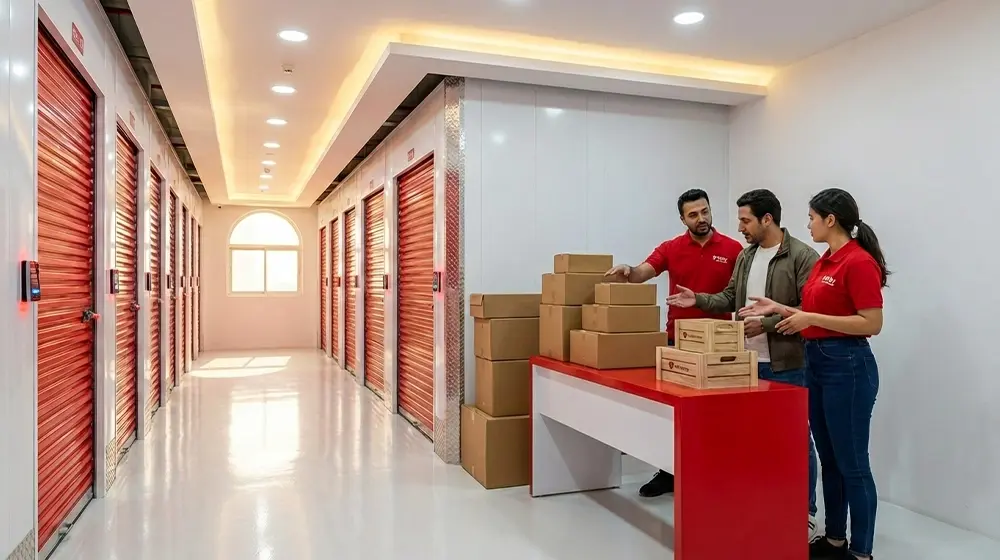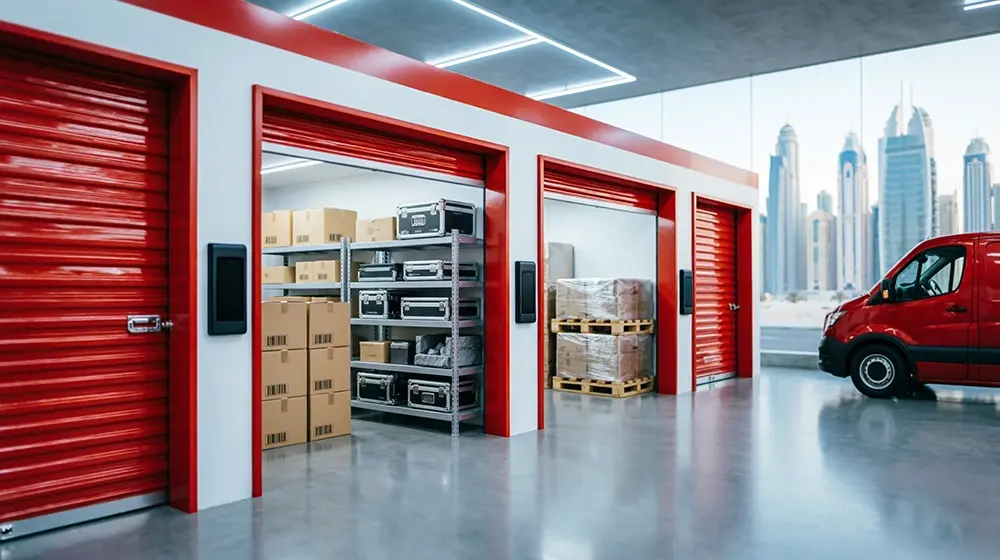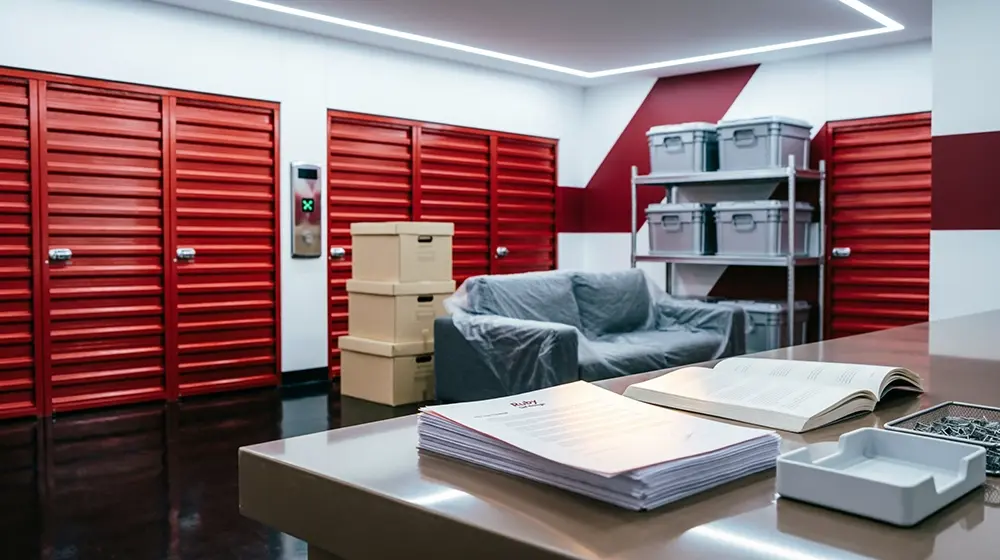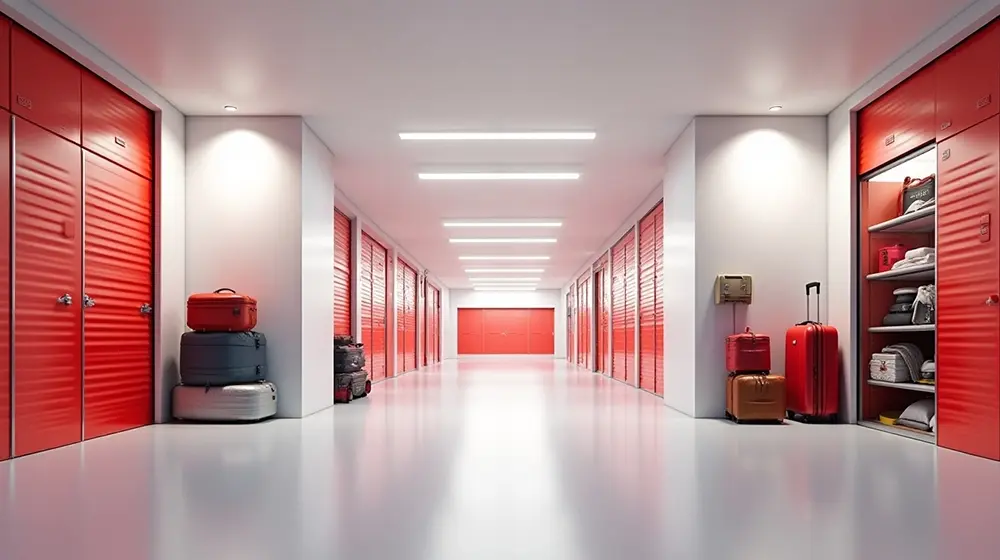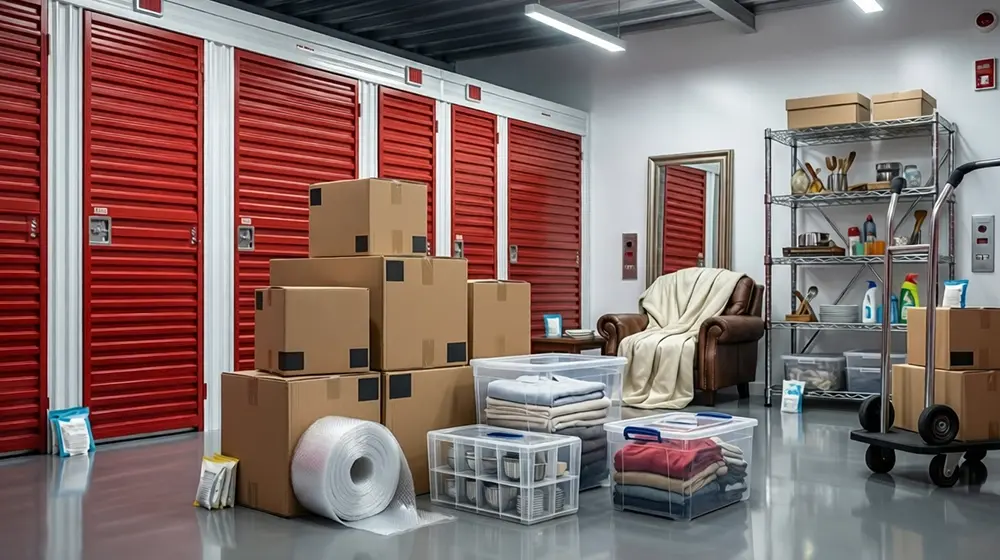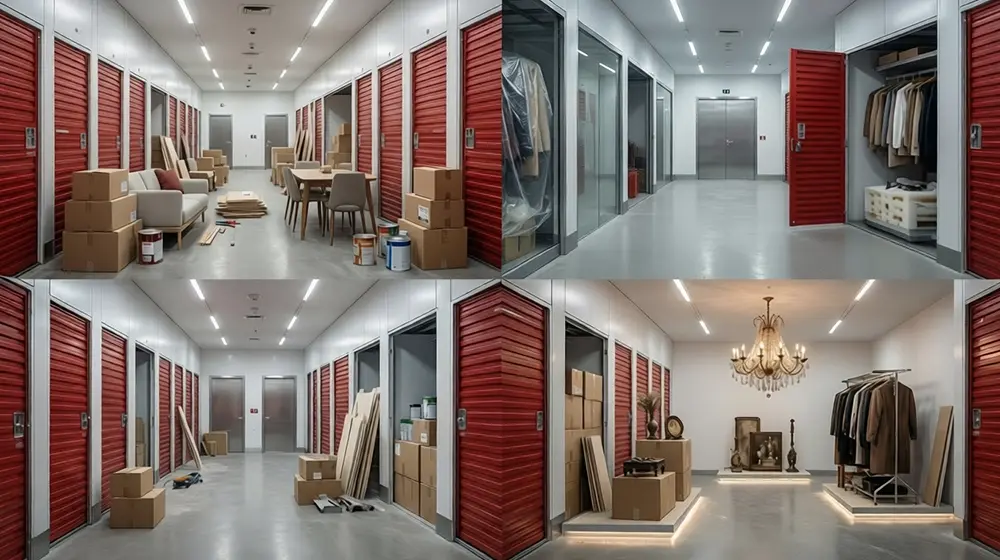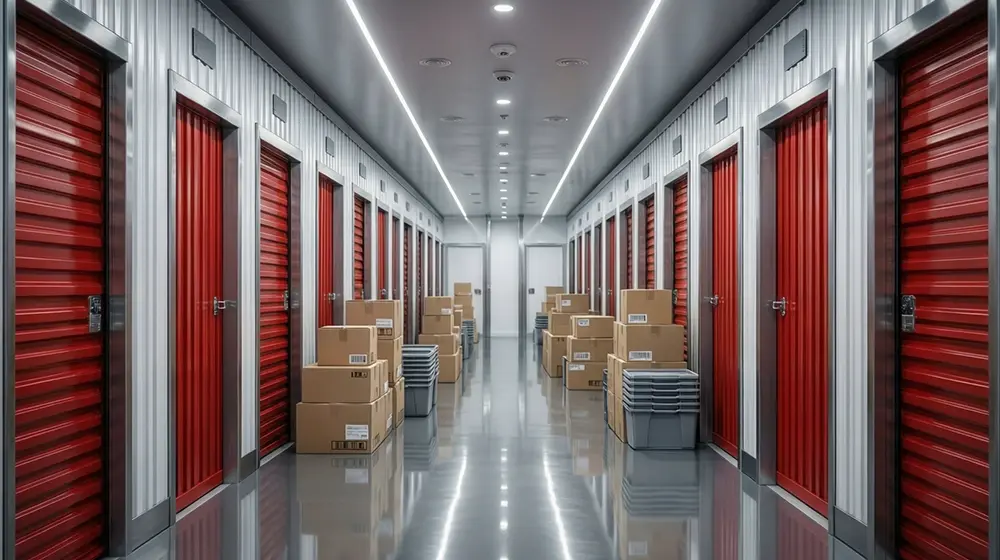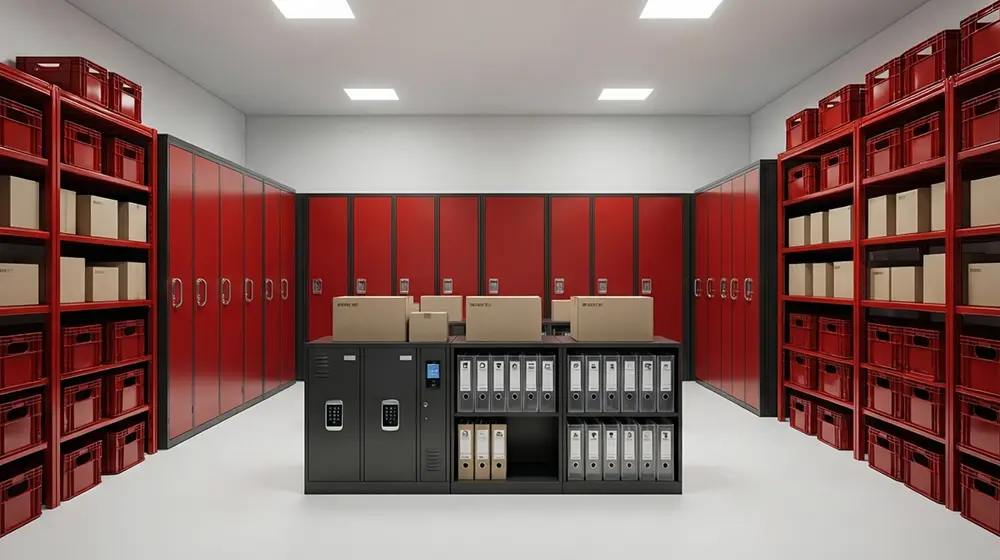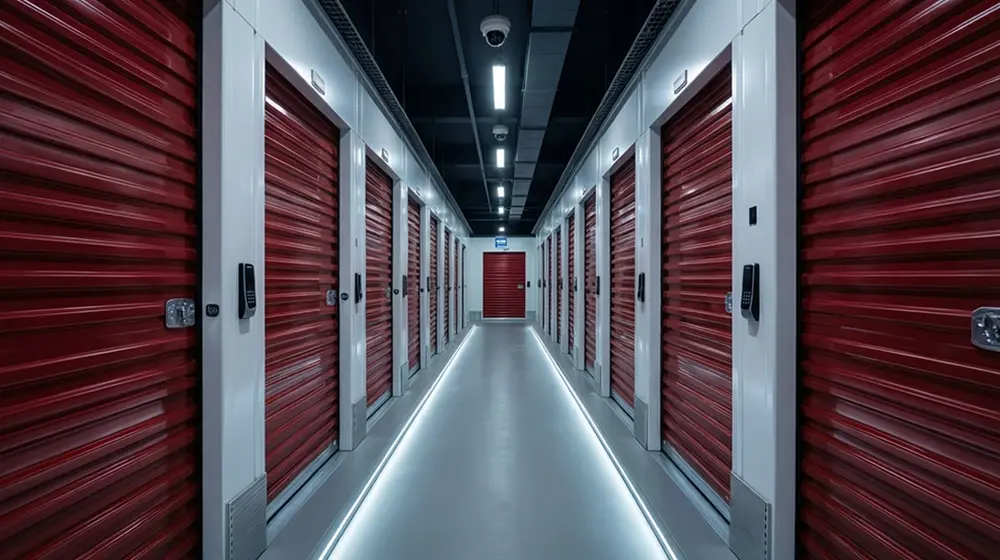Office storage demand is rising because rents and fit-out costs are high, while flexible space is scarce. Dubai warehouse rents rose +19.9% year-on-year to AED 46 per sq. ft, and occupiers face landlord-favored conditions with limited incentives.
Businesses need overflow capacity that does not lock them into long leases. Self storage in Dubai gives short-term, scalable office storage at predictable monthly prices. Finance teams compare these prices against prime office occupancy and fit-out costs to save capex and OPEX.
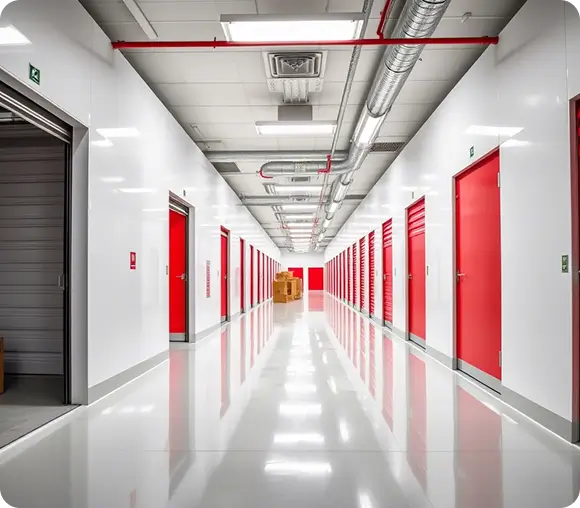
Who mainly uses self storage in Dubai for office storage?
Small and Medium Enterprises (SMEs) are the anchors of any economy as they are primarily responsible for driving job creation, innovation, exports, and new business models. SMEs account for 95% of the enterprise population in Dubai and are responsible for 43% of the total workforce and 40% of the total value added in the emirate.
SMEs often lack dedicated storerooms. E-commerce sellers manage seasonality, returns, and POS kits. Self storage in Dubai fits these patterns because it is modular, local, and easy to resize.
- E-commerce expansion: The UAE’s e-commerce market reached AED 32.3 billion (US$8.8 billion) in 2024 and is projected to surpass AED 50.6 billion (US$13.8 billion) by 2029, according to a report released by EZDubai, the fully dedicated e-commerce zone in Dubai South. Overflow inventory and last-mile staging increase office storage demand in storage facilities.
Where are the strongest submarkets that influence office storage pricing?
Al Quoz and Dubai Investment Park (DIP) anchor pricing signals for self storage in Dubai. Grade-A industrial rents in Al Quoz sit higher than DIP, and that premium often flows into office storage unit prices.
Watching Al Quoz and DIP helps time office storage procurement and choose trade-offs between proximity and rate.
- Market signal (Q2–H1 2025): Dubai average AED 46 per sq. ft; Al Quoz up to ~AED 65 per sq. ft in recent bulletins; DIP lower on average.
- Implication: Expect higher unit quotes near Al Quoz (CBD access) and better scale/availability in DIP and JAFZA corridors for office storage.
How does self storage in Dubai compare to leasing more office space?
Self storage is typically cheaper than prime office expansion once fit-out and OPEX are counted. Dubai’s prime office occupancy averages US$148.90 per square foot per annum. Storage units avoid long leases and capex.
Compare a 75 ft² storage unit with a 75 ft² office addition for one year. Storage avoids fit-out, reinstatement, and furniture costs, and it scales down after peak demand.
- Worked signal: 75 ft² storage ≈ AED 12,000–17,400/year before VAT, based on AED 1,000–1,450/month ranges; prime office of the same area costs much more before fit-out.
- Risk control: Month-to-month terms reduce lock-in; companies right-size to 25–50 ft² after a project ends.
What defines the market structure for self storage in Dubai (operators, formats, services)?
The market mixes multi-site operators and local providers offering business-grade features for office storage. Core services include climate-controlled rooms, CCTV, access control, fire systems, insurance options, and flexible contracts. Office storage users can match unit size to project cycles.
- Representative operators: Self Storage Dubai, Vachi Storage, Reef Storage; each lists business-sized units from 50–200 ft² with optional services.
- Flexible terms: Providers advertise month-to-month or short minimum terms, plus resizing paths.
- Business bundles: Pickup/packing, insurance tiers, access logs, and sometimes delivery options for SMEs.
How should a company scope office storage features and contracts?
Specify climate control, security, access logging, and insurance in the SLA; benchmark rates across districts before peak quarters. This reduces risk and price volatility for self storage in Dubai.
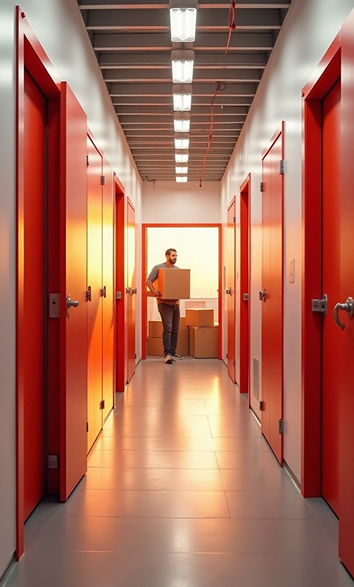
- Climate-sensitive items: Archives, electronics, prototypes; ask for climate control and confirm on-site.
- Security baseline: 24/7 CCTV, access control, unit alarms, fire protection; include access-log availability.
- Rate strategy: Compare Al Quoz vs DIP for identical sizes (50–75 ft²); lock 3–6-month rates when reports flag rent rises.
How do office storage costs in self storage in Dubai vary by unit size?
Costs range from AED 300/month for 25 ft² units to AED 4,000/month for 200 ft² business units.
Size is the most direct driver of price. Office storage users often book 25–200 ft², with climate control and security premiums applied. Providers publish banded ranges for SMEs and corporates.
- 25 ft² (file storage): AED 300–400/month.
- 50 ft² (archive cartons, IT kits): AED 850–1,100/month.
- 75 ft² (furniture, displays): AED 1,000–1,650/month.
- 100–120 ft² (overflow storage): AED 1,545–2,200/month.
- 200 ft² (SME inventory, staging): ~AED 4,000/month.
Dubai self storage cost brackets for office storage
Size (ft²) | Office storage use case | Monthly rent (AED) |
|---|---|---|
25 | Documents, binders, peripherals | 300–400 |
50 | Archive cartons, IT kits | 850–1,100 |
75 | Small fixtures, sample stock | 1,000–1,650 |
100–120 | Renovation overflow, furniture | 1,545–2,200 |
200 | SME inventory, staging projects | ~4,000 |
How do location and district rents affect office storage pricing?
Self storage operators pass on warehouse rental costs to tenants. Comparing Al Quoz and DIP shows how district economics filter into office storage costs.
- Al Quoz Grade-A rents: AED 72–100/ft²/year.
- DIP Grade-A rents: AED 50–70/ft²/year.
- Implication: Expect higher unit quotes in Al Quoz, especially for small 25–75 ft² office storage units near CBDs. DIP offers larger units at lower per-foot costs.
How do lease terms impact office storage costs in self storage in Dubai?
Shorter contracts carry higher monthly rates, while 3–6 month terms unlock discounts.
Flexibility is valuable, but longer terms stabilize pricing. Storage providers advertise monthly flexibility yet incentivize longer contracts.
- Month-to-month: Higher per-foot cost, easy exits.
- 3–6 months: Often 5–15% cheaper per month.
- 12 months: Sometimes fixed rates with insurance bundles.
For finance teams, fixing rates during upward rent cycles avoids mid-year cost spikes.
How do office storage costs compare to expanding office leases?
Comparisons must include occupancy cost, fit-out, reinstatement, and utilities. For SMEs, the delta is significant.
- Prime office occupancy (Dubai): ~AED 547/ft²/year.
- Fit-out costs: ~AED 1,285/ft².
- Worked example: 75 ft² in self storage = AED 12,000–17,400/year. Same 75 ft² in prime office = AED 41,000+ year before fit-out.
What add-on costs must be considered for office storage?
Insurance, VAT, and pickup/packing add 10–30% to total costs. Quotes on websites show base rents. Full budgets include extras depending on business needs.
- VAT: 5% applied to rental invoices.
- Insurance: Facility or third-party, AED 50–150/month.
- Packing/move-in: Provider pickup or professional movers can add AED 200–500 per trip.
- Deposits: One month’s rent upfront, refundable at exit.
How do climate-controlled units affect office storage costs?
Climate control adds ~10–30% premium on rent but prevents asset loss in Dubai’s humid environment. Near coastal areas, humidity averages between 50% and 60%, creating risks for paper and IT storage. Controlled environments preserve asset value.
- Baseline risk: Mold, adhesive failure, corrosion in electronics.
- SLA clause: Specify 18–24 °C / 40–55% RH.
- Premium worth paying: A small 25 ft² archive unit may rise from AED 350 to AED 450–500 with climate features, but prevents far greater loss.
Office Storage Trends in Self Storage in Dubai
How is seasonal demand shaping office storage trends?
Self storage demand spikes around Ramadan, Expo-linked events, and retail sales periods. Retailers and marketing teams use self storage for promotional stock and seasonal overflow. After events, units downsize to core archive functions.
- Ramadan/Eid campaigns: Large POS and product rollouts drive temporary storage demand.
- Expo legacy events: International fairs increase marketing storage needs.
- Retail sales (Black Friday, Dubai Shopping Festival): SMEs hold more inventory and returns.
How do compliance requirements create storage trends?
Retention rules of 5–7 years (VAT and Corporate Tax) require long-term storage, fueling demand for archive units. Legal obligations make office storage mandatory. Self storage facilities offer controlled, auditable spaces.
- VAT record-keeping: 5 years minimum.
- Corporate Tax record-keeping: 7 years minimum.
- Real-estate documents: Often kept for 15 years.
What sustainability trends affect self storage in Dubai?
Facilities highlight energy efficiency and ESG practices to attract corporate users.
Large firms align procurement with ESG goals. Operators that invest in efficient HVAC and solar panels gain an advantage.
- Green buildings: Dubai mandates efficiency in new commercial developments.
- Energy savings: Climate control optimized with smart systems reduces OPEX.
- Corporate optics: Storing in ESG-compliant facilities improves supplier reporting.
How is technology shaping office storage solutions?
Automation, smart locks, and digital inventory management are rising trends in self storage in Dubai. Providers compete on tech-enabled features. Business clients benefit from secure, trackable storage.
- Smart locks and apps: Access logs for compliance.
- Digital inventory tools: Scan cartons in/out.
- Online booking portals: SMEs secure space instantly.
What future trends will shape self storage in Dubai for office storage?
Hybrid work, AI-driven supply chains, and sustained SME growth will sustain demand through 2030. Office layouts change, but storage needs persist. Forward-looking firms view self storage as flexible infrastructure.
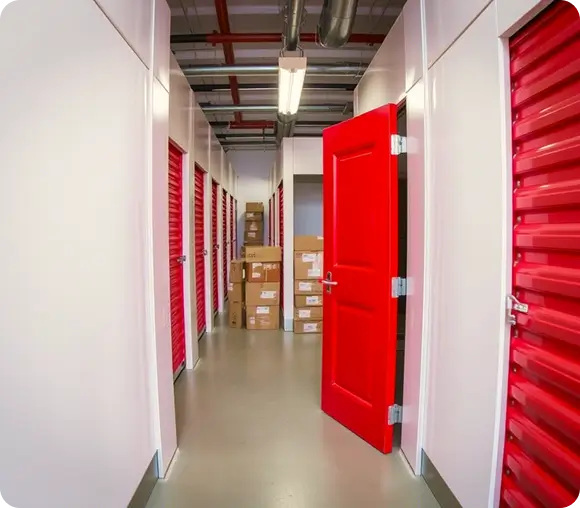
- Hybrid work: Less office floor space, but records and IT gear remain.
- AI logistics: Predicts overflow periods, integrates with storage planning.
- SME growth: Government targets an increase in SME contribution by 2030, keeping demand high.
Trends takeaway
Office storage in self storage in Dubai is shaped by structural rent growth, SME dominance, and e-commerce expansion. Seasonal events, compliance laws, sustainability mandates, and technology adoption all reinforce the need for flexible, climate-controlled storage.
Legal & Compliance Dimensions of Office Storage in Dubai
What record retention laws affect office storage in Dubai?
VAT requires 5 years; Corporate Tax requires 7 years; some documents, like real estate, must be retained up to 15 years. Legal timelines set minimum storage needs. Businesses must ensure documents are accessible, secure, and preserved under UAE law.
- VAT (FTA): Keep records for 5 years.
- Corporate Tax (FTA 2025 update): 7 years.
- Real-estate contracts: Up to 15 years recommended.
What SLA clauses ensure compliance for office storage?
SLA clauses should define retention years, climate setpoints, security protocols, access logs, and insurance. An SLA turns storage promises into enforceable terms. Without written commitments, companies face compliance risks.
- Retention horizon: Specify at least 7 years for Corporate Tax.
- Climate setpoints: 18–24 °C, 40–55% RH.
- Security: CCTV, access control, alarms, fire suppression.
- Insurance: Coverage limits per unit.
- Audit access: Ability to retrieve records quickly.
How does insurance affect compliance in office storage?
Insurance protects stored assets and provides risk mitigation to auditors. Insurance is often overlooked but critical. Businesses that store records without coverage risk total loss.
- Facility-provided insurance: Bundled, ~AED 50–150/month.
- Third-party insurance: Custom coverage for high-value items.
- Audit trail: Policy certificates show due diligence.
How do access logs support compliance in office storage?
Access logs prove document custody and help during audits. Auditors require a chain of custody for sensitive records. Access logs create transparency.
- Features: Timestamped entry/exit, user identification.
- Storage facilities: Provide logs via smart locks or staff records.
- Compliance role: Shows only authorized staff who handled archives.
How does Corporate Tax influence office storage demand?
Corporate Tax increases audit readiness requirements, driving demand for compliant storage. The UAE’s new Corporate Tax regime increases the burden of proof on financial records. Storage units provide low-cost, secure compliance solutions.
- 7-year retention: longer storage horizons.
- Auditable access logs: prove document custody.
- Cost-effective: archive 25–50 ft² units are cheaper than office floor space.
Legal & Compliance Takeaway
Self storage in Dubai is not just a cost-saving tool; it is a compliance safeguard. VAT and Corporate Tax laws mandate long retention; SLAs must specify climate, security, access logs, and insurance. Businesses that align contracts with UAE law reduce risk and audit exposure.
Problem–Solution Angles in Self Storage in Dubai
What is the problem with soaring office rents in Dubai, and what is the solution?
Problem: Prime office occupancy in Dubai is US$148.9/ft²/year (~AED 547), one of the highest in the world.
Solution: Use self storage in Dubai for small office storage needs instead of expanding leases.
Businesses in Dubai are under pressure as rents increase while incentives decline. Self storage provides a cost-controlled alternative for files, IT gear, and overflow.

- Office lease expansion: Adds rent, fit-out, and service charges.
- Self storage: Offers AED 300–1,450/month units without long-term commitments.
- ROI: A 75 ft² storage unit costs ~AED 12–17k/year vs ~AED 41k/year for equivalent office space.
What is the problem with record retention laws, and what is the solution?
Problem: UAE Corporate Tax requires 7-year record retention, and VAT requires 5 years.
Solution: Store archives in climate-controlled office storage units within self storage in Dubai.
Companies must keep records for audits and inspections. Office space is too expensive for long-term storage of boxes and files.
- VAT rule: 5 years.
- Corporate Tax rule: 7 years.
- Office storage solution: 25–50 ft² archive units with access logs, ~AED 300–900/month.
What is the problem with Dubai’s humid climate, and what is the solution?
Problem: Dubai’s humidity averages 59%, peaking at 65% in winter; paper, textiles, and electronics degrade in such conditions.
Solution: Lease climate-controlled office storage units with stable 18–24 °C / 40–55% RH.
Humidity and heat cause mold, adhesive breakdown, and electronic damage. Standard warehouses do not protect sensitive files and IT assets.
- Controlled storage premium: Adds 10–30% to rent.
- Asset protection: Cheaper than replacing records or equipment.
- Compliance benefit: Audit-ready conditions for financial files.
What is the problem with inventory overflow during peak seasons, and what is the solution?
Problem: SMEs and retailers face overflow during Ramadan, the Dubai Shopping Festival, and Black Friday.
Solution: Use flexible self storage units in Dubai that can scale from 50 ft² to 200 ft² as needed.
Seasonality is intense in Dubai. Businesses cannot afford permanent larger offices for short-term peaks.
- Short-term leases: 1–3 months.
- Scalability: Providers allow upgrading/downgrading.
- Cost example: 200 ft² unit ~AED 4,000/month; downsize after peak to 50 ft² (~AED 850–1,100/month).
What is the problem with security risks for business storage, and what is the solution?
Problem: Office records, IT kits, and marketing assets are vulnerable to theft or fire.
Solution: Contract business-grade self storage in Dubai facilities with CCTV, alarms, access control, fire suppression, and insurance.
Auditors and compliance officers ask for proof of secure custody. Security lapses can lead to loss, fines, or reputation damage.

- Standard features: 24/7 CCTV, access control, alarms.
- Insurance tiers: AED 50–150/month add-on.
- Audit trail: Access logs with timestamps.
Problem–Solution Takeaway
Self storage in Dubai solves real office challenges: high rents, record retention, humidity risks, seasonal overflow, and security needs. Each problem has a clear, cost-effective storage solution that beats office expansion.
What are the steps for procuring office storage in self storage in Dubai?
The procurement process involves needs analysis, provider shortlisting, site visits, SLA negotiation, and contract execution.
A structured procurement cycle ensures that office storage aligns with compliance, budget, and operational needs. Businesses should treat self storage procurement with the same rigor as leasing office space.
Steps:
- Needs analysis: Define cubic footage required, record-retention timelines, climate requirements, and security needs.
- Provider shortlist: Identify 3–5 providers in Al Quoz, DIP, and JAFZA with proven business storage facilities.
- Site visits: Inspect physical units, check climate controls, security systems, and accessibility.
- SLA negotiation: Specify climate (18–24 °C / 40–55% RH), CCTV, insurance, retention horizon, and access logs.
- Contract execution: Lock multi-month pricing, clarify renewal clauses, and pay the refundable deposit.
How should businesses negotiate SLAs for office storage in Dubai?
An SLA should specify temperature, humidity, security, insurance, access logs, and service continuity. Service-level agreements reduce risk exposure. Without documented commitments, businesses face potential compliance and cost issues.
- Temperature range: 18–24 °C.
- Humidity: 40–55% RH.
- Security: 24/7 CCTV, alarms, and access logs.
- Insurance: AED 50–150/month depending on coverage.
- Continuity: Clauses for disaster recovery or relocation in case of facility shutdown.
What security checklist should be followed when choosing office storage in Dubai?
Businesses should require CCTV, alarms, access logs, fire suppression, and insurance proof. Security is non-negotiable for records and IT equipment. Facilities that fail security audits expose companies to theft or liability.
How should climate control be validated in self storage in Dubai?
Climate systems should be verified with monitoring reports and sensor data. Dubai’s heat and humidity require proof of a stable environment. Businesses should not rely on verbal assurances.
- Request data: 30-day climate logs from sensors.
- On-site check: Verify HVAC equipment is operational.
- SLA clause: Specify penalties for climate deviations.
Conclusion: Why Self Storage in Dubai Defines the Future of Office Storage Costs and Solutions
Self storage in Dubai has become more than an alternative to office expansion. It is a cost-control strategy, a compliance safeguard, and an operational tool that businesses of all sizes now rely on. Rising rents in Dubai’s prime districts, the surge of e-commerce, and the long record-retention rules of VAT and Corporate Tax have reshaped how companies think about space.
The market outlook is equally strong. Industrial rents rose 19.9% YoY in 2025, signaling continued cost pressure on office space. SMEs represent 95% of Dubai’s business ecosystem, and e-commerce revenues are projected to rise from AED 32.3 billion in 2024 to AED 50.6 billion in 2029. These fundamentals guarantee sustained demand for flexible office storage solutions in the city’s self storage market.
In summary, self storage in Dubai has transitioned from a consumer service into a core part of business infrastructure. It offers measurable cost savings, compliance alignment, and scalability unmatched by office expansions. As rents climb and regulations tighten, self storage stands as the smarter, ROI-driven solution for office storage in Dubai.
Frequently Asked Questions (FAQs): Self Storage in Dubai for Office Storage Costs, Trends & Solutions
What is the starting cost of office storage in self storage in Dubai?
Small units of 25 ft² start from AED 300–400 per month, depending on the provider.
How much does a 50 ft² office storage unit cost in Dubai?
On average, AED 850–1,100 per month, depending on location and climate control.
How do office storage costs in self storage compare to leasing more office space?
Storage is 60–70% cheaper; a 75 ft² unit costs ~AED 12,000–17,000/year vs ~AED 41,000+ in office rent.
Which districts in Dubai offer the best value for office storage?
Al Quoz is central but higher priced; Dubai Investment Park (DIP) offers larger, lower-cost units.
How does climate affect the need for office storage in Dubai?
Humidity averages 59% annually; climate-controlled units protect paper and IT equipment.
What climate ranges should be specified for compliant office storage?
18–24 °C temperature and 40–55% relative humidity should be written into the SLA.
What legal retention rules drive demand for office storage?
UAE VAT law requires 5 years; Corporate Tax law requires 7 years; real-estate documents may need 15 years.
What security features should businesses demand in self storage in Dubai?
24/7 CCTV, access control, alarms, fire suppression, and insurance coverage.
How do SMEs benefit most from office storage in Dubai?
SMEs save on rent, free up office space, and meet compliance affordably with 25–75 ft² storage units.
What future trends will impact self storage in Dubai for businesses?
E-commerce growth, SME expansion, sustainability mandates, and smart storage technologies will drive the market through 2030.
